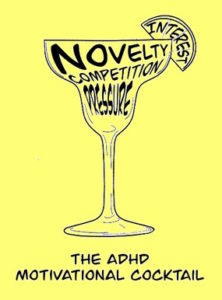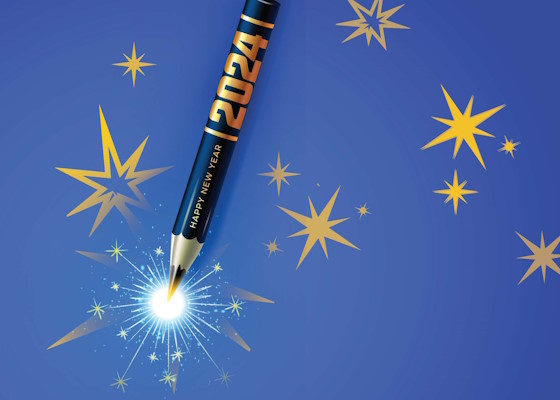Reignite Your Resolutions
Attention Magazine February 2024
 It’s February. The holidays are a distant memory; the weather is gray, and your local CVS is drowning in a sea of hearts and chocolates.
It’s February. The holidays are a distant memory; the weather is gray, and your local CVS is drowning in a sea of hearts and chocolates.
So, of course, those New Year’s resolutions are going strong—right?!?! (She said with a mighty wink.)
Of course not.
Weeks have passed, the shine has worn off, life happened, and at this point, those resolutions might feel like just one more thing that didn’t get done.
If that’s you right now, know you’re not alone—and it’s not a matter of character, either—there are some very brain-based reasons why resolutions are hard to keep up.
Why resolutions are so appealing at first, but so hard to hold onto
In many ways, New Year’s Resolutions are the perfect potion for ADHD brains. They tend to be the magic blend of the four ADHD motivational factors—novelty, competition, interest, and pressure—that can light up our brains and get us into action.
All this magic motivational juice feels great and can get us moving on things we could barely even think through before. And so, we once again jump at the chance to set new resolutions each new year.
Until… life throws us off course, or time passes, or other things catch our attention, and it suddenly feels like all that gas that had us going a million miles an hour has suddenly been drained from our tank, and our gears grind to a halt.
What’s going on? Why do resolutions work so well at first and then stop? It’s all about the most potent magic ingredient of the motivational cocktail: novelty.

Novelty isn’t just a pretty shine; it’s a genuine, neurochemical-inducing boost for the ADHD brain. In fact, fMRI studies show that novelty stimulates the reward centers of ADHD brains more than neurotypical brains.1 And researchers believe that novel stimulation gives our brains the focus, attention,2 mood,3 movement, and creativity boost4 we love so much!
So, those shiny new resolutions that seemed so exciting and reachable on January 2nd? By the time February rolls around we lose that magic novelty juice, and sticking with the resolution feels just like sticking to anything else—really darn hard!
That’s the bad news.
The good news is that we don’t have to wait until the calendar turns to 2025 to get that novelty train rolling again. We can combine a fresh approach with a new week, month, or day; sprinkle in some clear goal-setting and accountability, and presto! That motivational cocktail is back in business.
So, if you’re ready to dust off those resolutions and get those intentions rolling again, read on because I’ve got not one, but two resolution recommitment strategies that work for ADHD brains.

Strategy #1
Set a New Year’s Theme.
![]()
Tired of the vague intentions that run stale year after year? Rather than setting a specific goal, try setting a theme for your year, something that can move and shift with you as you grow and change throughout the year.
For example, rather than saying, “I’m going to lose weight this year,” your theme could be “health.” Then, any healthy action counts—eating more greens, cutting out sugar, limiting your alcohol use, exercising, taking the stairs, or making a doctor’s appointment.
Here’s why New Year Themes work: Rather than telling yourself you are going to do one thing all year long—a plan sure to fail a novelty-seeking brain—a category for the year allows you to choose an action from a broad list that is most appealing to your brain on any given day/week/month.
Here’s how to make a New Year’s Theme work.
Create a menu. Do the hard work of figuring out ways to stick to your theme ahead of time (while the dream is still exciting and new) and write down all the various big and small actions you might take that fit the theme. For example: is your theme strong relationships? Great! Calling your mother, texting a friend, making plans for a dinner party, and hugging your kids can all be on your New Year’s Theme menu. Use this menu for those days when you are fresh out of inspiration or when it gets to be 9 pm and you realize, “Shoot, I didn’t do anything for my theme today!”
Define your why. Get clear on the reason you set the theme. Is rest your goal this year? It’s a good one, but its value could be more explicit. Why do you want to get more rest? Is it so you can feel more present with your family? Is it so you stop getting sick so often? Or do you want to feel your worth outside of everything you do for everyone else? What exactly does this theme bring to your life? A well-defined “why” will help propel you when your motivation flags much better than a vague one.
Create a prompt. Brains don’t think to do things without a cue. And ADHD brains need a particularly obvious cue to help them remember a task. So, give your brain some clear cues to remind you of your theme. It could be a post-it on your mirror, an alarm on your phone, a bracelet engraved with your theme, or a giant poster board with the name of your theme hung on your closet door. Whatever it is, make it obvious and change it up every so often so your brain doesn’t just pass it over as part of the scenery.
Set a realistic time frame. You probably won’t stick to your theme every single day. But how about once a week? Or every weekday? How often do you want to emphasize this theme? Figure that out in advance and ensure your cues are ready to remind you when you need them.
Find a theme buddy. Accountability is one of the best ways to get you through motivational lags. Find a partner who also wants to try a New Year’s Theme. Set up a regular check-in, a Friday afternoon call, a daily text, or a monthly dinner. Find a regular time that you guys will check in on the progress you’ve made on the goal and set your intentions for the future as well.

Strategy #2
Make a DREAMY resolution.
![]()
Still have your heart set on setting that concrete resolution that you know would make a difference in your life? Feel like a theme just isn’t defined enough, doesn’t quite get you where you need to go? That’s great, too. You can make a resolution work for you and your brain by transforming a vague, idealistic goal into a DREAMY one instead.
Defined. Get specific about your resolution. Want to lose weight? How much? Want to wake up early and exercise? What time? What exercise are you going to do? Specific goals are easier to reach because you do half the work ahead of time by front-loading the executive functioning work and mapping out exactly where you’re going and how you will get there.
Resilient. You WILL fall off of your resolution. I promise. Your brain isn’t wired for consistency, and life WILL get in the way. That’s okay. When we own the inconsistency and see it just as our brains doing what our brains do rather than yet another thing to beat ourselves up about, then we can focus on resiliency instead of that boring old consistency. Getting back on the horse will help you reach your goal much faster than if you fall off and tell yourself it was stupid even to try to ride in the first place.
Easy. Or maybe not easy, but an attainable challenge—or, as Ned Hallowell says—the right kind of hard. Consider where you’re starting and what you can expect of yourself in that time frame. Big goals can be motivating, but they can also be overwhelming. So reach for something just out of your grasp but not so far away that you don’t even know where to start.
Accountable. Find a way to remain accountable. Find a buddy, tell your partner, post it on social media, or tell your boss. Give people permission to check in with you and give them some language to hold you accountable when you fall off the horse.
Measure your success. Tracking your progress toward a goal helps your brain by activating its reward center.5 And our brains love few things more than a reward center hit. So we double down and do it again and again. So keep a chart, use a calendar, or download a habit-tracking app- mark down each time you complete your resolution. Try competing with yourself to see how many days in a row you can accomplish the goal. Or give yourself a “never miss twice” rule. But no matter what, keep charting.
Yours. Make sure the resolution appeals. Not just the big why; of course, that needs to appeal. But also the daily action. Maybe you don’t like exercising, but you are resolving to do it three times a week this year. Okay, how can you make that more appealing? Does joining a group class help? How about watching your favorite show while you slog away on the treadmill? Would doing it while you chat with a friend make it better? If the new task isn’t appealing somehow, I guarantee it won’t be done. So find your in, the thing that draws you to it repeatedly, and you won’t have to worry about digging up the motivation over and over again.
So go ahead—make February the new “New Year” and inject some of that potent novelty juice back into your resolutions by giving them a theme or making them dreamy. Who knows what this year could bring!


 Marcy M. Caldwell, PsyD, is a licensed clinical psychologist who specializes in the treatment and assessment of adult ADHD. She is based in Philadelphia, Pennsylvania. In addition to her private therapy practice, Dr. Caldwell is the director and chief psychologist at Rittenhouse Psychological Assessments, LLC, as well as the senior assessment supervisor at Tuttleman Counseling Services at Temple University and lecturing professor at the University of Pennsylvania. She has also worked at Seabrook House, The JJ Peters Institute and Villanova University, focusing on therapy and assessment with late adolescents and adults related to topics of ADHD, learning disabilities, addiction, eating disorders and student success.
Marcy M. Caldwell, PsyD, is a licensed clinical psychologist who specializes in the treatment and assessment of adult ADHD. She is based in Philadelphia, Pennsylvania. In addition to her private therapy practice, Dr. Caldwell is the director and chief psychologist at Rittenhouse Psychological Assessments, LLC, as well as the senior assessment supervisor at Tuttleman Counseling Services at Temple University and lecturing professor at the University of Pennsylvania. She has also worked at Seabrook House, The JJ Peters Institute and Villanova University, focusing on therapy and assessment with late adolescents and adults related to topics of ADHD, learning disabilities, addiction, eating disorders and student success.